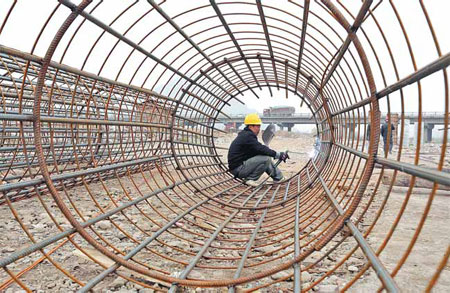Roadmap on reform 'will curb local debt'
Policy changes will ease financial pressures, support project funding
The world has been talking about China's increasing local government debt piling up, how bad is it really?
It is "under control", said a senior economic policy official on Nov 20 in Beijing.
Yang Weimin, an official with the Leading Group on Finance and Economics of the Communist Party of China Central Committee, said the amount of local debt is risky but remains manageable.
The debt raised by local governments to finance their own development projects has grown quickly, he says.
But if measures pledged in the reform roadmap adopted by the Third Plenum of the 18th CPC Central Committee are followed, local debt won't be a major problem, Yang says. In fact, the reform efforts will ease local government debt burdens, he says.
The details are still being worked out by officials, he adds, and will be unveiled nationwide in due course. The National Development and Reform Commission will come up with an annual target list to carry out the reform initiatives.
The National Audit Office last reported local government debt at the end of 2010, giving the figure as 10.72 trillion yuan ($1.77 trillion). Economists' estimates of current local debt range from 20 trillion yuan to 30 trillion yuan, with the latter equivalent to 60 percent of the GDP.
At the Third Plenum, China's leadership unveiled a reform agenda for the next decade, pledging to let the market play a "decisive" role in the economy and outlining sweeping changes to unleash fresh drivers of growth.
Guo Weimin, an official with the State Council Information Office, says minister-level officials will be invited to give news briefings on the reform agenda in coming days.
The Third Plenum agreed to expand vehicles for financing urban construction, and Yang says this indicates that local governments will be granted the right to raise debt directly.
"To that end, the Budget Law, which prohibits such debt-raising, should be revised," he says.
Yang dismisses any concerns that the gradual opening of local government debt-raising will lead to uncontrollable risks, saying that many measures pledged in the reform agenda are designed to ensure an improved local tax system, and that more involvement of private capital in infrastructure construction will ease the burden on governments.
Davide Cucino, president of the European Chamber of Commerce in China, calls the decision a wide-ranging and ambitious plan but says the hardest steps lie ahead.
He notes that the full benefits of further opening-up can only be realized if access is granted to all players and not just domestic companies.
zhaoyinan@chinadaily.com.cn
|
A worker welds a steel frame for a bridge under construction in Linzhou, Henan province. The National Development and Reform Commission is expected to work out an annual target list to implement reform initiatives mapped out at a key leadership meeting earlier this month. Bi Xingshi / for China Daily |



















